Terence Stamp, the English actor whose piercing blue eyes and magnetic presence made him one of Britain’s defining screen figures of the 1960s and whose icy portrayal of General Zod in the Superman films later sealed his fame with new generations — has died at 87.
His family confirmed his death on Sunday morning in a statement to Reuters, praising “an extraordinary body of work, both as an actor and a writer, that will continue to touch people for years to come.”
Born in Stepney, East London, in 1938 to working-class parents, Stamp once seemed destined for a quiet career in advertising. Instead, a scholarship to drama school launched him into a cinematic age that prized charisma as much as craft. His first major role, in Billy Budd (1962), brought him instant acclaim: an Oscar nomination for best supporting actor and a Golden Globe for best newcomer.
The 1960s belonged to him as much as to the bands and models of Swinging London. His striking looks, cutting-edge fashion, and high-profile romances with actress Julie Christie and later with model Jean Shrimpton, made him as much a figure of style pages as of film credits. The Kinks even immortalized his brief relationship with Christie in their hit Waterloo Sunset, with the wistful refrain: “Terry meets Julie.”
Read also: Actor Buscemi “Okay” Following Assault In New York City
On screen, however, he quickly showed a darker versatility. As the chilling kidnapper Freddie Clegg in The Collector (1965) and the rakish Sergeant Troy in Far From the Madding Crowd (1967), Stamp brought an unsettling intensity that undercut his matinee-idol looks. Later, he would inhabit one of cinema’s most memorable supervillains, General Zod, opposite Christopher Reeve in Superman (1978) and Superman II (1980), a role he played with Shakespearean menace and regal detachment.
Yet his trajectory was not without rupture. When Sean Connery stepped away from the role of James Bond, Stamp was considered as a replacement. But his unorthodox ideas for the part, he later admitted, unnerved producer Harry Saltzman. “I think my ideas put the frighteners on Harry,” he recalled. “I didn’t get a second call.”
By the end of the 1960s, the sparkle of London’s cultural scene had dimmed, and Stamp so closely identified with that era, found himself adrift. “When the ’60s ended, I think because I’d been so identified with it, I kind of ended as well,” he told Desert Island Discs. “There’s been a lot of fun, but there hasn’t been any real, deep internal satisfaction.”
He retreated from film, traveling the world on a one-way ticket and spending time in India studying yoga and living in spiritual retreat. It was a period of both reinvention and despair. “I never imagined this would happen,” he said of his sudden professional exile. “I always thought after six months some great part would come up and nothing did.”
Stamp eventually returned to acting, working with European auteurs like Pier Paolo Pasolini and Federico Fellini, and later carving out memorable roles in films such as The Adventures of Priscilla, Queen of the Desert (1994), The Limey (1999), and Valkyrie (2008). Each performance carried the stamp — no pun intended — of a man who had known both the giddy heights of fame and the long silence of absence.
Terence Stamp never entirely escaped the aura of Zod, nor the mythology of the 1960s, but perhaps that was fitting. He was, in the end, a man who embodied his times and who, even in later years, spoke of them with both pride and rueful distance.

